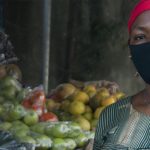COVID-19 has disrupted programs that assist vulnerable populations worldwide. In addition to education, schools provide daily meals and other services that many families depend on; when schools closed during the pandemic, those services ceased. Kibrom Abay and colleagues explore the food security consequences of [...]
NEW PUBLICATION: 2020 Annual Report
IFPRI’s 2020 Annual Report presents highlights from our research work around the world. Cutting-edge research on the impacts of the COVID-19 pandemic and related policies, and on our strategic research areas—climate resilience and sustainability, healthy diets and nutrition, inclusive and [...]
Launch event: Agricultural Investment Data Analyzer (AIDA) guides policy makers on potential economic and social impacts
Dalia Elsabbagh, IFPRI Egypt
Investments in agriculture can have broad economic and social impacts. To help developing countries analyze those effects and promote more evidence-based decision-making, IFPRI, the International Fund for Agricultural Development (IFAD) and the IFPRI-led CGIAR Research Program on Policies, Institutions, and Markets (PIM) created the Agricultural Investment Data Analyzer (AIDA) tool.
The Structuring and Good Governance of the Pulses Sector in Morocco: Results from an e-Delphi Survey
Larbi Toumi - Agro-socio-economist and General Affairs Manager, the Secretariat General of the Ministry of Agriculture, Maritime Fisheries, Rural Development, Waters and Forests, Rabat (Morocco)
Food security is on the political agenda of both developing and developed countries and materialized in the action of public authorities who see food governance as a lever to meet the multiple challenges of sustainability. Among the crops that respond to these challenges, pulses are taking an increasingly important role in the agricultural policies of many countries. This choice stems from environmental and economic challenges that push public policies to move towards more sustainable food systems, where pulses [...]
Lessons from IFPRI country programs on influencing policy decisions and strengthening capacity
Frank Place and Peter Hazel, IFPRI
It is often argued that the more researchers engage with policymakers, the more likely that their evidence will be used in policy decisions; also, that engagement is enhanced when researchers reside in the countries where they are conducting research. These notions were put to the test in a recent set of studies that examined the contributions of IFPRI’s decentralization strategy, and in particular its country programs (CPs), to policy outcomes and subsequent impacts.





